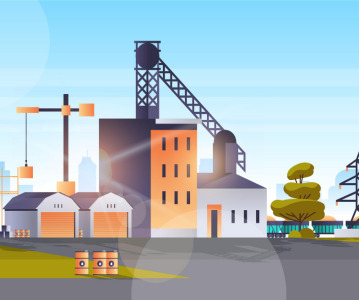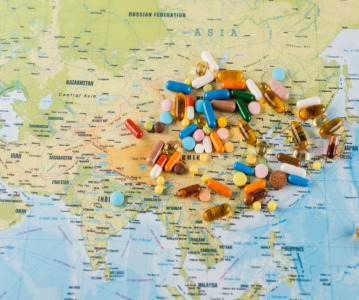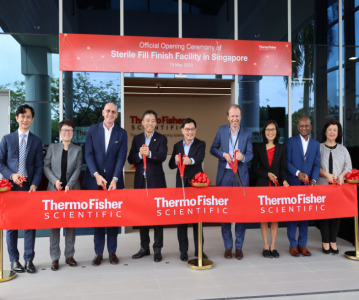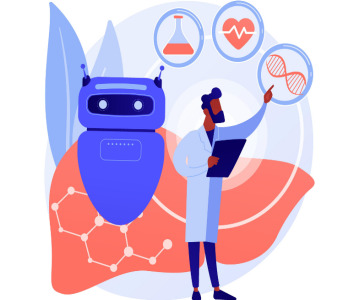Steps for Building Supply Chain Integrity and Resilience in Europe

Speakers from the European Fine Chemicals Group, the voice of fine chemical manufacturers in Europe, led a discussion on the ‘globalised, fragmented and complex’ API and raw materials supply chain, in this month’s edition of the CPHI Webinar Series.
Gildas Barreyre, General Secretary at Seqens and Dirkjan van Zoelen, Manager Development and Technical Support at Aspen Oss B.V, both representing the EFCG, shared the historical background of global API production, sharing that in the year 2000, Europe held a strong position as a global API producer with 53% of CEP manufacturers worldwide.
Fast forward to 2020, and this figure drops to 33%, with the majority of manufacturers (59%) now located in Asia – a shift driven by the potential for high volume, low margin production. Investment and operating costs for active ingredients are estimated to be 20-40% lower in Asia.
While price and volume might offer distinct advantages, such reliance on Asian manufacturers does lead to a number of vulnerabilities in the supply chain for APIs and raw materials in Europe. An IQVIA study conducted for the EFCG estimates overall EU dependency on Asia to be 74%, of which 70% is upon China.
The EFCG shared these concerns with the EU commission pre-pandemic about the dependence upon Asian manufacturers for Europe’s needs, and is working towards a more ‘robust, sustainable and competitive’ infrastructure for the production of APIs, raw materials, and intermediates, highlighting a few key areas which expose vulnerability in the EU supply chain:
1. Scarcity of Technology
Some of the key technologies required to manufacture a multitude of APIs are now either scarce or completely unavailable within Europe – this includes nitration, fermentation, chlorination, and fluorination.
As an example, only 27% of European manufacturers are currently able to use nitration technology – despite the fact that 65% of API production routes require this capability.
Source: IQVIA
2. Quality Control
While cost and volume have long been an advantage of manufacturing APIs in Asia, concerns over product quality have led to plant shutdowns, which in turn creates shortage of supply.
Steps have been taken to mitigate quality concerns, for example the creation of working groups, like that between China’s NMPA and the European Commission’s DG Sante, to identify training needs in the API space and enforce GMP standards. Regardless, van Zoelen says local government’s act swiftly when concerns arise, and if you are dependent on non-compliant supplier for a specific molecule, this is highly disruptive.
3. Supplier Consolidation
Where suppliers consolidate and the end result is one or two major players who take the lead in meeting global demand, a vulnerability is created in the supply chain. As we saw with COVID, if those who have the monopoly on production are not able to meet demand due to logistical challenges or disruption, this has serious consequences for those regions relying on consistent supply of raw materials and APIs.
The presenters shared examples from numerous studies which have identified Europe’s dependence on Asian suppliers as the main cause of vulnerability, such as the ProGenerika study (Sept. 20) commissioned by German generics producers, which traced the EU's heavy dependence on 22 critical active ingredients, and the IQVIA study1 (Jan. 21) commissioned by the EFCG on the root causes of vulnerabilities in the medicines chain.
Steps for a more robust and resilient European supply chain
How can these vulnerabilities be addressed for long-term supply chain security and resilience in Europe? The speakers outline three measures which the EFCG is working towards, to build more competitive manufacturing capabilities in Europe, and to level the playing field between European and Asian producers.
1. Supporting an innovative, competitive and sustainable European offer - Building a dynamic, competitive and innovative pharmaceutical industry ecosystem by supporting the reshoring of critical technologies and strengthening local manufacturing capabilities.
2. Promote sustainable production in public tenders and price policies - Integrate criteria such as security of supply and environmental policies into supplier selection criteria, and reform pricing policies and reimbursement mechanisms in Europe.
3. Financing innovation along the value chain for greener and more efficient manufacturing processes – Supporting innovation across the entire value chain for more sustainable and efficient manufacturing processes – a key differentiator between European and Asian production, and maintaining and developing the EU skills and knowledge base.
The full webinar is now available to access on-demand, for free. Click here to watch.
Related News
-
News Eisai begins US FDA rolling submission for Alzheimer’s drug Leqembi
Japanese drugmaker Eisai, in partnership with Biogen, have announced that they have begun submitting data on a rolling basis to the US FDA for a marketing application of a subcutaneous injectable form of Alzheimer’s drug Leqembi. -
News ONO Pharmaceutical expands oncology portfolio with acquisition of Deciphera
ONO Pharmaceutical, out of Japan, is in the process of acquiring cancer-therapy maker Deciphera Pharmaceuticals for US$2.4 billion. -
News Novel approach to creating sustainable packaging from rice husks
Researchers have created a new approach to the designing of eco-friendly nanofibres extracted from rice husks, addressing the critical need for sustainable packaging materials in food and biopharmaceutical products. -
News CPHI Podcast Series: The ripple effects of nearshoring in pharma
In the most recent instalment of the CPHI Podcast Series, Digital Editor Lucy Chard is joined by Sandra Sánchez y Oldenhage, President and CEO of PharmAdvice, to discuss nearshoring and reshoring in the pharmaceutical industry, and the subs... -
News Update: Samsung Biologics manufacture Pfizer's biosimilars
Samsung Biologics agrees to use their biocampus Plant 4 for the manufacture of a line of products from Pfizer. -
News Novartis agrees for copies to be made of cancer drug to reach poorer countries
Novartis signs agreement with MPP to have generics of it's leukemia drug made so that it can be more easily distributed to the world's poorer countries. -
News Thermo Fisher Scientific opens new steriles drug manufacturing site in Singapore
The life science service and instrument provider have opened their new Singapore-based steriles drug manufacturing facility with the goal of bringing increased development and manufacturing capabilities for critical medicines to the APAC region. -
News Digital-first experimental approach to optimise drug formulations
Merck and XtalPi Inc. collaborate on an AI-powered technology platform to predict the crystal morphologies of diabetic medication metformin HCl, validated by wet-lab experiments conducted with Merck’s expertise, in a ‘digital-first’ a...
Recently Visited
Position your company at the heart of the global Pharma industry with a CPHI Online membership
-
Your products and solutions visible to thousands of visitors within the largest Pharma marketplace
-
Generate high-quality, engaged leads for your business, all year round
-
Promote your business as the industry’s thought-leader by hosting your reports, brochures and videos within your profile
-
Your company’s profile boosted at all participating CPHI events
-
An easy-to-use platform with a detailed dashboard showing your leads and performance
.png)

.png)




